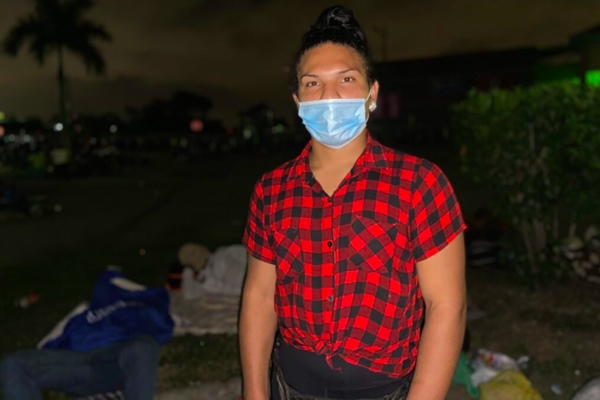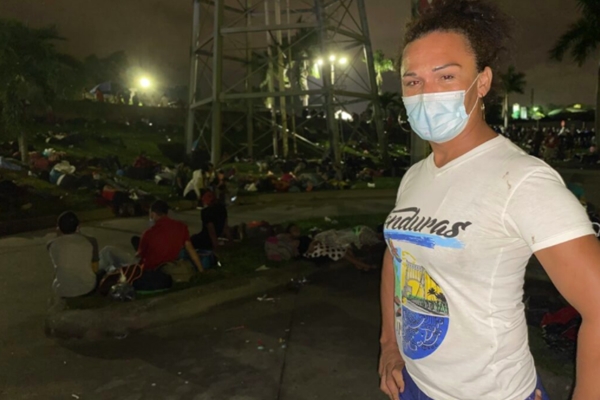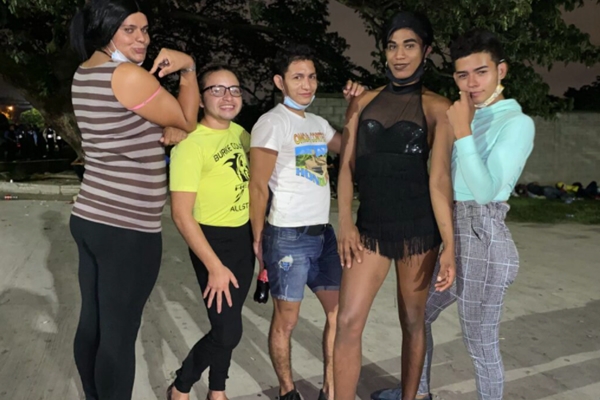This is how 300 LGBTQ people in the first Honduran migrant caravan of 2021 live
100 transgender women are part of the more than 300 LGBT+ Hondurans who have decided to flee their country in a migrant caravan that left from San Pedro Sula early on Jan. 15, 2021. They are all stranded in Chiquimula, Guatemala, as they wait for the authorities of this country to allow them to enter Mexico and onwards to their destination in the United States.
Like the remaining 8,000 members of this first migrant caravan of 2021, the 300 members of the Honduran LGBTQ community have endured long walks through the rain and the cold, uncomfortable trips in the back of cars and trucks, in addition to being clubbed and hit by Honduran and Guatemalan military forces.
Police and military repression
In Aguascalientes, where they were reportedly taken under false pretenses from infiltrators, hundreds of Honduran soldiers and police armed with tanks, rifles and pistols waited for about 1,000 Honduran migrants. The soldiers had orders to shoot at them if they resisted returning to Honduras, according to an observer from an international group.
Meanwhile, in El Florido, the caravan’s actual meeting point on the border between Honduras and Guatemala, Guatemalan military forces responded to the caravan’s intention to pass through that Central American country in order to reach Mexico with sticks and blows.https://www.youtube.com/embed/cwBt5g2a6M0?wmode=transparent&modestbranding=1&autohide=1&showinfo=0&rel=0
Trans men and women, lesbians and gays are fleeing inequality, discrimination and poverty caused by the profound inequality of which diverse populations are victims. LGBTI migrants who are part of this caravan are also fleeing the COVID-19 pandemic, as well as the effects of Hurricanes Eta and Iota that ravaged the country in November 2020.
A large part of the LGBTI community in northern Honduras lost their homes and belongings when the passage of the two hurricanes destroyed entire neighborhoods and buried them under tons of mud.
The government of Juan Orlando Hernández has not done all of the work it said it would do in the areas affected by the natural phenomena that devastated the country last year. There are entire neighborhoods that are still buried under mud and where no medical teams or government food aide has reached.
Agencia Presentes accompanied many of the Honduran trans women who undertook the journey with the first migrant caravan of the year.
Transphobia in the caravan
Groups of LGBTI+ people, especially trans women and gay men who have a feminine gender expression, are physically harassed during the caravan’s journey as Agencia Presentes, which accompanied the 8,000 migrants to the border of Honduras and Guatemala, saw.
An example of mistreatment and discrimination against LGBTI+ groups in the migrant caravan is the case of Fabiola, 20, who traveled from Tegucigalpa to flee discrimination and transphobia.
During her journey, a man demonstrated his strength by hitting Fabiola “to remove her from the men’s line.” Presentes observed a series of verbal insults and harassment against trans women by people who used words such as “faggots,” “idiots” and “assholes,” among others.

Although it is the second time she has traveled, Fabiola this time hopes she will be able to cross the border, travel through Mexico and arrive safely in the U.S.
The trans women walked hundreds of kilometers to reach the border. They were exhausted and their feet were sore. They preferred to walk on foot rather than return to the back of cars or pick-up trucks because they face more danger and harassment if they climb back into the cars. In the case of getting into a pick-up truck, they never do it alone. They do it in a group to avoid as much discrimination and ridicule as possible.
Many of the trans women did not bring any money with them for the trip, so some of them were left behind along the way. They hoped to obtain some resources to continue the trip.
“We have suffered discrimination. We live in the department of Colón and they don’t accept us for who we are, they look at us like a phenomenon,” Salomé, a trans woman from Honduras’ Atlantic coast, tells Presentes.

“When you go to ask for support, what they do is discriminate against us. After the pandemic, sex work collapsed and we have fewer and fewer resources for daily subsistence,” said a trans woman from the municipality of Villanueva who did not want to be identified.
Gissele fled Valle in the department of Nacaome with a group of gay men. It is not the first time that she has done it, but she has faith that this time she will make it to the United States. She hopes to get papers that legally certify her as a woman. “They discriminate against us, they mock us and we don’t have work,” she lamented.

Danny, 19, escaped from his house because he could not be who he is. His mother does not yet know that he is heading to the United States or that he is facing a series of challenges in Guatemala to reach Mexico. That doesn’t matter to Danny, who lives in Santa Bárbara, one of the departments with the highest rates of sexual abuse and discrimination against adolescents and young people.
Honduras is one of the worst countries to be an LGBTIQ+ person. The government headed for the last eight years by Juan Orlando Hernández has blocked a gender identity law in the National Congress. The Supreme Court of Justice, in addition, has not ruled that same-sex couples can enter into civil unions, despite the work of organizations such as Cattrachas, Somos CDC, Kukulkán and OPRUCE, among others.